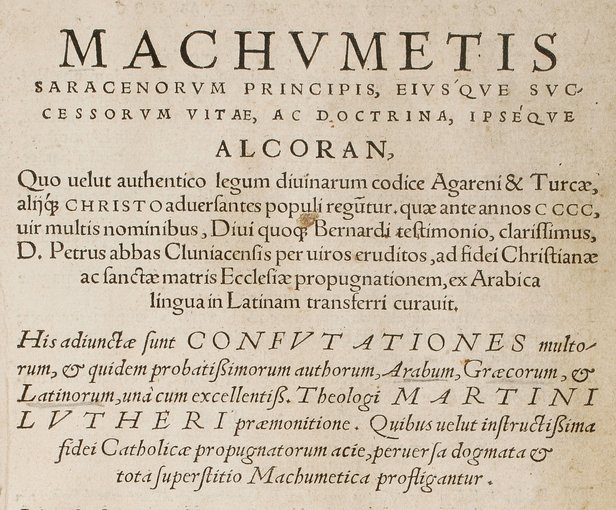 The Qur'an was first translated into Latin in 1153, but the first latin translation published was in 1543 (and 1550) when Theodor Bibliander (1509-1564) published his latin translation of the Qur'an in Basle with the title "The lives and teaching of Muhammad, leader of the Saracrens, and of his successors, and the Qur'an itself" (Machumetis Saracenorum principis eiusque successorum vitae ac doctrina ipseque Alcoran). Bibliander's Qur'an was initially a banned book, but Martin Luther and Philip Melanchthon advocated for the publication of the Qur'an and the ban was lifted.
The Qur'an was first translated into Latin in 1153, but the first latin translation published was in 1543 (and 1550) when Theodor Bibliander (1509-1564) published his latin translation of the Qur'an in Basle with the title "The lives and teaching of Muhammad, leader of the Saracrens, and of his successors, and the Qur'an itself" (Machumetis Saracenorum principis eiusque successorum vitae ac doctrina ipseque Alcoran). Bibliander's Qur'an was initially a banned book, but Martin Luther and Philip Melanchthon advocated for the publication of the Qur'an and the ban was lifted.
 Martin Luther and Philip Melanchthon wrote back-to-back Latin prefaces to Bibliander's Qur'an because they believed that it was important for the contents of the Qur'an to be accessible for the purpose of refutation. Sarah Henrich and James L. Boyce have translated and published a full translation of Martin Luther's "Preface to Bibliander's Edition of the Qur'an (1543)" in Word & World, Vol. XVI, No. 2. The preface is written in Luther's hallmark rhetorical style (that was common for his era but not acceptable for discourse today), including many antisemitisms, and condemnations of Roman Catholics, Anabaptists, and other individuals. Luther also refers to Muslims as "Turks" eponymously and with the same rhetorical style.
Martin Luther and Philip Melanchthon wrote back-to-back Latin prefaces to Bibliander's Qur'an because they believed that it was important for the contents of the Qur'an to be accessible for the purpose of refutation. Sarah Henrich and James L. Boyce have translated and published a full translation of Martin Luther's "Preface to Bibliander's Edition of the Qur'an (1543)" in Word & World, Vol. XVI, No. 2. The preface is written in Luther's hallmark rhetorical style (that was common for his era but not acceptable for discourse today), including many antisemitisms, and condemnations of Roman Catholics, Anabaptists, and other individuals. Luther also refers to Muslims as "Turks" eponymously and with the same rhetorical style.
Despite Martin Luther's offensive rhetoric, his work to make a Latin translation of the Qur'an published for the first time is admirable, and it is significant that this pinnacle reformer was instrumental to of one of the most important editions of the Qur'an.
A quotation from Martin Luther's 1542 preface to the Qur'an:
Therefore, as I have written against the idols of the Jews and the papists, and will continue to do so to the extent that it is granted me, so also I have begun to refute the pernicious beliefs of Muhammad, and I will continue to do so at more length. But in order to do this, it is also useful to study closely the writings of Muhammad themselves. Accordingly, I have wanted to get a look at a complete text of the Qur’an. I do not doubt that the more other pious and learned persons read these writings, the more the errors and the name of Muhammad will be refuted. For just as the folly, or rather madness, of the Jews is more easily observed once their hidden secrets have been brought out into the open, so once the book of Muhammad has been made public and thoroughly examined in all its parts, all pious persons will more easily comprehend the insanity and wiles of the devil and will be more easily able to refute them. This is the reason that has moved me to wish to publish this book. [2]
If I receive permission, I will share the entire translation of the preface, but in the interim it may be read in entirety in Word & World, Vol. XVI, No. 2 (pages 262-266). Additionally, Philip Melanchthon's latin preface (Praemonitio) to Bibliander's Qur'an (1543) is available online here (but I have not tracked down a translation of it yet).
Source:
1. Image of Luther's preface of Theodorus Bibiliander's translation of the Qur'an, (source: wikipeda)
2. Sarah Henrich and James L. Boyce, Word & World, Vol. XVI, No. 2, Luther Seminary, Spring 1996, pp. 262-266
3. Image of Qur'an (source: wikipedia)



Leave a comment